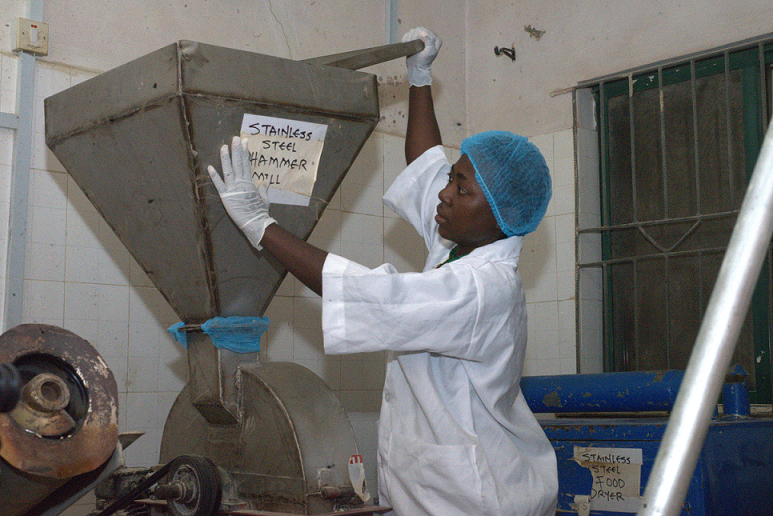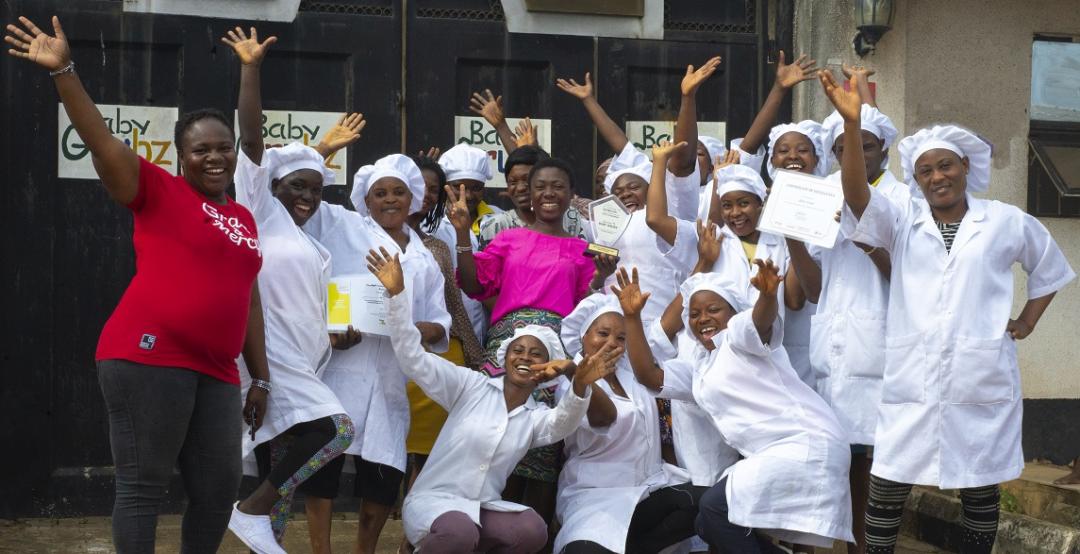Healthy, affordable baby food supplemented with nutrition education addresses child malnutrition in Nigeria
BabyGrubz is an inclusive business that produces a wide range of affordable dried homemade cereals, grains, fruits, vegetables and condiments while also providing income for families through the sales of the products. The Grubz is currently sold in Nigeria, Ghana and the United Kingdom.
Can you tell us more about your reasons for founding the Baby Grubz company?
It was borne out of a personal desire; after I had my son and he refused to take infant formula, I had to extend my maternity leave to remedy the situation. He later developed rickets at around nine months. After we visited the hospital, I was made to realize that the lasting solution was nutrition. At the hospital, we got some recommendations on what to feed him but then the meal suggestions were expensive and mostly not tasty.
Our regular visits to the doctor’s office opened my eyes to the mortality situation of children under five in Nigeria. I constantly ran into other clueless mothers and hungry children and I knew there should be a homegrown and sustainable solution to address the hidden hunger and malnutrition in children, and I decided that I was going to do something about it.
Your distributors are trained to provide peer mentoring as nutrition educators. Why did you decide to supplement your sales with mentoring, and how are the mentors trained?
A number of mothers were practicing very dangerous feeding practices of force feeding children, even abusing drugs to make children eat. It was imperative to raise awareness about these fatal practices and also to train them on better solutions that we had developed. We thought it best to do it through peer-peer mentoring for more sustained impact.
Almost every mum I encountered constantly asked the same questions that I had about feeding children. I was stretched thin at a point and I knew that we needed a more sustainable model to pass on this information. We hold online trainings via WhatsApp and Zoom and share training materials via WhatsApp and emails. The micro-entrepreneurs also double as peer mentors in their communities. We create income opportunities by making them direct sales representatives in their communities to both business-to-business (B2B) and business-to-consumer (B2C) customers.
How do you ensure that your baby food products are high quality and affordable for underserved communities, while also running a profitable business?
For high quality: We use high quality raw materials with special care on traceability and adherence to safe and best practices in manufacturing processes – GMP (Good Manufacturing Practice), GHP (Good Health Practice) and also manufacturing to Codex standards in a sterile and controlled environment. We also use semi-automated machines to reduce human contact and risk of contamination.
For affordability: We constantly are looking for ways to bring down production costs through innovative raw materials and bulk production, and we are currently looking into sachetization of our products (to allow us to sell them in small packets).

How important was it to digitize your business? Did you receive any support to help you digitize?
It was important to digitize from the get go. The first place I went for information when I was clueless about feeding my baby was online (I am part of the demography) and I couldn’t find any reliable source. Nigeria is the country with the 7th largest number of internet users via mobile connections in the world. Our audience is online and it was a no brainer to meet them there. We received expert support from GAIN through BoP Inc digital experts. This also helped reduce cost of market entry which otherwise would have been steep for brick and mortar stores. We leveraged our online communities for a number of years before we opened our first factory.
What level of impact have you had on family livelihoods and child survival? How do you measure this impact?
We measure by the audience we engage on our online platforms (live videos, chats, engagements); we also measure by the number of products we have sold and the number of women distributors who have registered to be sellers of Baby Grubz in their communities.
To date, we have directly empowered over 200 women micro businesses, employed 18 women in our factory and transformed the nutritional status of over 200,000 children via sales and consumption and 350,000 via our social media platforms.
Indirectly, we have been able to reach over 2,000,000 children and over 500,000 mothers through our outreach and advocacy programs. We organize tasting parties and Grubz School Nutrition Drives at schools. The former is a practical cooking and tasting to show the versatility and usage of our meals while the latter is a drive to sensitize parents and caregivers on balanced nutrition and best practices.

Do you plan to expand? What do you need in order to reach your goals for the next few years?
We are currently in our expansion processes. We are constructing a purpose built factory and have currently imported some equipment to produce 10 times our current output. To achieve this we will require some external funding for other corresponding needs like human resources, raw materials, an in-house laboratory, marketing and more, and so we are actively seeking investments into the business to move faster in equity or convertible debt for this.
Our next goals include solidifying our reach in Ghana, while also creating a tasty zinc-rich product and other nutritious and affordable new lines for the underserved communities.
